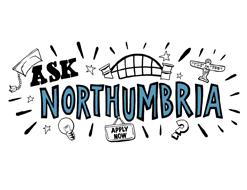-
Study
-
Quick Links
- Open Days & Events
- Unlock Your Potential
- Tuition Fees, Funding & Scholarships
- Open Day 25th October
-
Undergraduate
- Application Guides
- UCAS Exhibitions
- Extended Degrees
- School & College Outreach
- Information for Parents
-
Postgraduate
- Application Guide
- Postgraduate Research Degrees
- Flexible Learning
- Change Direction
- Register your Interest
-
Student Life
- Students' Union
- The Hub - Student Blog
- Accommodation
- Northumbria Sport
- Support for Students
-
Learning Experience
- Real-World Learning
- Research-enriched learning
- Graduate Futures
- The Business Clinic
- Study Abroad
-
-
International
International
Northumbria’s global footprint touches every continent across the world, through our global partnerships across 17 institutions in 10 countries, to our 277,000 strong alumni community and 150 recruitment partners – we prepare our students for the challenges of tomorrow. Discover more about how to join Northumbria’s global family or our partnerships.
View our Global Footprint-
Quick Links
- Course Search
- Undergraduate Study
- Postgraduate Study
- Information for Parents
- London Campus
- Northumbria Pathway
- Cost of Living
- Sign up for Information
-
International Students
- Information for International Students
- International Events
- Application Guide
- Entry Requirements and Education Country Agents
- Global Offices
- English Requirements
- English Language Centre
- International student support
- Cost of Living
-
International Fees and Funding
- International Undergraduate Fees
- International Undergraduate Funding
- International Masters Fees
- International Masters Funding
- International Postgraduate Research Fees
- International Postgraduate Research Funding
-
International Partners
- Agent and Representatives Network
- Global Partnerships
- Global Community
-
International Mobility
- Study Abroad
- Information for Incoming Exchange Students
-
-
Business
Business
The world is changing faster than ever before. The future is there to be won by organisations who find ways to turn today's possibilities into tomorrows competitive edge. In a connected world, collaboration can be the key to success.
More on our Business Services -
Research
Research
Northumbria is a research-rich, business-focused, professional university with a global reputation for academic quality. We conduct ground-breaking research that is responsive to the science & technology, health & well being, economic and social and arts & cultural needs for the communities
Discover more about our Research-
Quick Links
- Research Peaks of Excellence
- Academic Departments
- Research Staff
- Postgraduate Research Studentships
- Research Events
-
Research at Northumbria
- Interdisciplinary Research Themes
- Research Impact
- REF
- Partners and Collaborators
-
Support for Researchers
- Research and Innovation Services Staff
- Researcher Development and Training
- Ethics, Integrity, and Trusted Research
- University Library
- Vice Chancellors Fellows
-
Research Degrees
- Postgraduate Research Overview
- Doctoral Training Partnerships and Centres
- Academic Departments
-
Research Culture
- Research Culture
- Research Culture Action Plan
- Concordats and Commitments
-
-
About Us
-
About Northumbria
- Our Strategy
- Our Staff
- Our Schools
- Place and Partnerships
- Leadership & Governance
- University Services
- Northumbria History
- Contact us
- Online Shop
-
-
Alumni
Alumni
Northumbria University is renowned for the calibre of its business-ready graduates. Our alumni network has over 250,000 graduates based in 178 countries worldwide in a range of sectors, our alumni are making a real impact on the world.
Our Alumni - Work For Us
What will I learn on this module?
On this module you will learn to read texts written in the period 1500-1700 historically. Lectures and seminars will encourage you to learn about the early modern period, and to situate texts by authors such as William Shakespeare, Christopher Marlowe, Thomas More, and Philip Sidney. You will learn about poetry, prose, and drama – situating literary genres from the period in relation to themes that include: class, race, sexuality, politics, authority, gender, and ideas of literary production itself. Lectures will trace the afterlives of some of the most influential texts ever written, and will encourage you to read these textual traditions in light of a range of western literary ideologies.
Building upon work completed at Level 4 on early modern authors like Shakespeare and Donne, this module offers students a more comprehensive survey of the early modern period. Encouraging students to read literature historically, Early Modern Cultures fosters key skills in tutor-led and independent reading and research that will complement a range of studies at level 6.
How will I learn on this module?
2 x 1-hour lectures
1 x 1-hour seminar
This module will be delivered through two weekly 1-hour lectures (and two film screenings in week 6), and one 1 hour seminar. Lectures will be focused upon specific texts, on contextual concepts relevant to those texts, and on academic skills tailored for the module’s assessment tasks. In addition to learning during contact hours with the module lecturers, you will be expected to undertake both directed and independent learning. Directed learning generally will take the form of preparation for seminars where you will be expected to contribute to discussion. Informal presentations will be used as well as group work to facilitate student engagement.
Independent learning generally will take the form of further reading and investigation, the consolidation of seminar notes, and revision/preparation for the assessment of the module.
How will I be supported academically on this module?
Lectures and tasks for these will develop your academic skills as you engage with primary, secondary, theoretical and contextual materials to allow you to attain the module learning outcomes, and, more importantly perhaps, to enjoy reading and thinking about early modern literature in context. The module handbook provides details of lectures, reading lists and assessment criteria; lecture PowerPoint slides are made available on the e-learning portal. The module tutor will be available in lectures, as well as in office hours and on email/phone, to discuss any queries or concerns you have about how to excel academically on the module. Moreover, feedback on formative work will serve as ‘feed forward’, giving guidance on how to improve during the module. In addition, you have a designated Guidance Tutor throughout the entire duration of your programme. The academic side of the Guidance Tutor’s role includes:
• monitoring your ongoing academic progress
• helping you to develop self-reflection skills necessary for continuous academic development
• directing you to further available services which can help them with their academic skills (e.g. Library’s Skills Plus)
You are advised to see your Guidance Tutor at least twice each semester to review your academic progress. The Guidance Booklet, which you receive at the start of your first year, includes structured materials designed to help you develop your self-reflection skills. These materials underpin the academic side of the regular Guidance meetings, helping you to learn how to best use the feedback you receive on your assignments, how to build on your strengths, and improve in the areas where you could perform better.
What will I be expected to read on this module?
All modules at Northumbria include a range of reading materials that students are expected to engage with. Online reading lists (provided after enrolment) give you access to your reading material for your modules. The Library works in partnership with your module tutors to ensure you have access to the material that you need.
What will I be expected to achieve?
Knowledge & Understanding:
1 a specialised knowledge of selected early modern texts and their contexts
Intellectual / Professional skills & abilities:
2 an ability to analyse early modern literature, paying attention to thematic concerns and formal features
3 a capacity to select relevant primary and secondary materials and to deploy this evidence in discussing issues relevant to early modern texts
Personal Values Attributes (Global / Cultural awareness, Ethics, Curiosity) (PVA):
4 an ability to use critical theories to interpret drama in its contexts and ours
5 skills conforming to relevant standards of good academic conduct in the expression of an informed argument in written and oral forms through completing the various activities prescribed
How will I be assessed?
Formative (practice) assessment:
1. 1000-word essay plan. Writing this plan and receiving feedback on it will help you:
• identify the question you intend to answer
• identify the texts you plan to use to answer the question
• provide some description of how you intend to answer the question
• offer some detail about how you will structure your response
• present some examples of secondary material you plan to use
• ask your tutor for advice about any specific areas of concern or query
This formative assessment will aim to ensure you organise your ideas and material for the assessed essay, by selecting relevant primary and secondary resources to help you answer the question they have chosen. Written feedback on this plan will be provided, as well as opportunities to meet the tutor for a one-to-one meeting. The rationale for this is to enable you to road-test ideas before committing yourself to an argument or position. This assessment addresses MLOs in Knowledge and Understanding, Intellectual/Professional skills & abilities, and PVA.
Summative (graded) assessment:
1. 1000 word critical review (30%)
This assessment requires you to read three critical articles (from the online reading list) and critique one of them – describing and analysing the critic’s argument in detail.
This is designed to help you practice critical reading and writing strategies, to strengthen these skills before you undertake longer independent research and writing tasks.
MLOs 3, 4, 5
2. 2000 word essay (70%)
For this task you will have to write an essay referring to at least three of the plays we have studied on the module (one of which from weeks 7-11) in response to a set of questions.
The aim of this 2000-word essay is to give you the opportunity to situate and analyse early modern texts in their immediate historical contexts, while expressing your arguments in a format with which you should now be familiar – and that conforms to high standards of academic conduct. This assessment tests your skills in written expression, research, close textual analysis, referencing, and contextualisation. It also helps you develop your expertise in structuring arguments in long pieces of written work, which is vital preparation for your dissertation or project in your third year.
Feedback will be provided using the Departmental template and comments on the script. This assessment addresses MLOs 1-5 .
Pre-requisite(s)
N/A
Co-requisite(s)
N/A
Module abstract
Please find details of this module in the other sections provided.
Course info
UCAS Code QW38
Credits 20
Level of Study Undergraduate
Mode of Study 3 years Full Time or 4 years with a placement (sandwich)/study abroad
School Humanities and Social Sciences
Location City Campus, Northumbria University
City Newcastle
Start September 2026
All information is accurate at the time of sharing.
Full time Courses are primarily delivered via on-campus face to face learning but could include elements of online learning. Most courses run as planned and as promoted on our website and via our marketing materials, but if there are any substantial changes (as determined by the Competition and Markets Authority) to a course or there is the potential that course may be withdrawn, we will notify all affected applicants as soon as possible with advice and guidance regarding their options. It is also important to be aware that optional modules listed on course pages may be subject to change depending on uptake numbers each year.
Contact time is subject to increase or decrease in line with possible restrictions imposed by the government or the University in the interest of maintaining the health and safety and wellbeing of students, staff, and visitors if this is deemed necessary in future.
Useful Links
Find out about our distinctive approach at
www.northumbria.ac.uk/exp
Admissions Terms and Conditions
northumbria.ac.uk/terms
Fees and Funding
northumbria.ac.uk/fees
Admissions Policy
northumbria.ac.uk/adpolicy
Admissions Complaints Policy
northumbria.ac.uk/complaints













